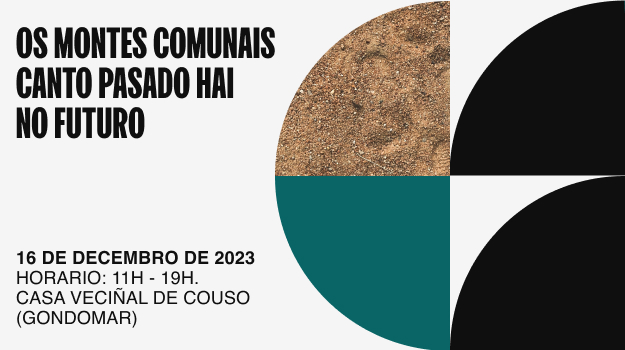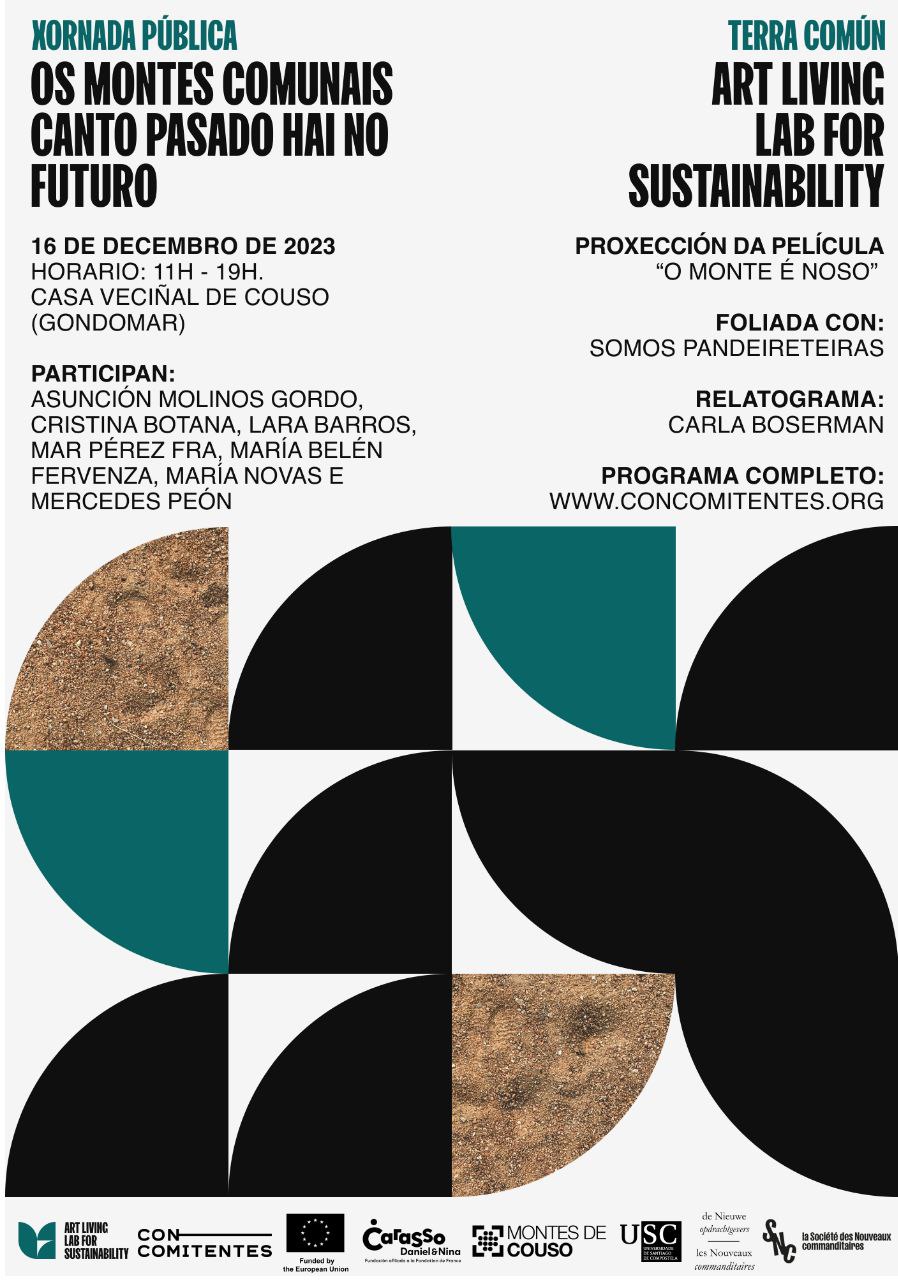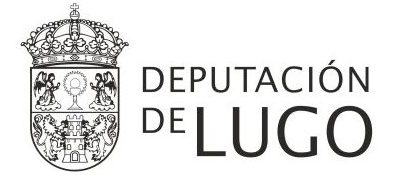Common Ground' organises a meeting to focus on the power of the commons

Date 16/12/2023
Place Couso Neighbourhood House (Gondomar, Pontevedra)
Timetable 11.00hrs - 19.00hrs
Participants Fran Quiroga, Natalia Balseiro, Xosé Antón Araúxo, Lara Barros, Mar Pérez Fra, María Belén Fervenza, María Novas, Cristina Botana, Asunción Molinos Gordo, Mercedes Peón and Somos Pandereteiras.
In this meeting, which aims to deepen the knowledge about the management models of the communal forests, the artist, Asunción Molinos Gordo, who has been invited to initiate the artistic process with the community of Couso, will be presented.
To read the text in Galician click here.
*See the timeline of the day, designed by Carla Boserman, here*
January 2023 saw the start of the 'Common LandThe community of Montes de Couso began to dream about their future, following the traces of their past.
Through a participatory process, guided by the mediator Natalia BalseiroIn this way, a dialogue has been opened that will define the collective desire, inspiring an artistic intervention that will raise awareness of the ways in which the communal forests are managed, strengthen the sense of belonging to this community and ensure that new generations will perpetuate this legacy.
After this intense year of mediation, research, listening and negotiation, 'Common Ground' reaches the halfway point of its journey, and it does so by celebrating the day Montes Comunales. How much of the past is in the future'.which will take place on Saturday, 16 Decemberin the Couso Neighbourhood House (Gondomar, Pontevedra), here the exact meeting point.
From an ecofeminist perspective the aim is to deepen the knowledge of communal forests and their management from a historical, present and future perspective.The project was combined with the analysis, from an artistic perspective, of the tradition and knowledge of the forest communities.
The session will be kicked off by the historian, Lara Barroswho will talk about the contrast between the past and the future in rural areas; the USC lecturer, Mar Pérez Frawill explore the strengths and challenges facing local forests today, while the member of the Reboreda forest community in Redondela and biologist, María Belén Fervenza Couñagowill address the possibilities of generational change in this type of environment. The morning will be rounded off with a talk on neighbourhood woodlands by the doctor of architecture, María Novas Ferradásand the researcher Cristina Botana.
After lunch there will be a screening of the film O monte é Nosoby Llorenç Soler. This will be followed by the presentation of the artist, Asunción Molinos Gordowho has been invited to initiate the artistic process with the community of Couso. Through a conversation with the mediator of 'Tierra Común', Natalia Balseiro, the artist and researcher will talk about her professional career, delving into her way of working and sharing the experience with some of her most relevant projects, both at national and international level, which will inspire the process she is starting in Couso and whose results will see the light of day in autumn 2024.
The day will close with a talk on tradition and artistic creation by the artist and researcher, Mercedes Peónand a party hosted by the '.We are Pandereteiras'.
The whole activity will feature the artist Carla Boserman which will generate a narrative of the ideas and conclusions drawn from the speeches.

The full content of the programme of this meeting and invitation is as follows:
11.00hrs. Welcome and presentation of the day
- Fran Quiroga, mediator and general coordinator of Concomitentes
- Xosé Antón Araúxo, president of the Community of Montes de Couso
- Natalia Balseiro, researcher, curator and mediator of the project 'Tierra Común'.
11.30hrs. How much of the past is in the future
- Lara Barros, historian specialising in rural societies. She is the driving force behind Mulime, a professional historical and documentary research project for Neighbourhood Forestry Communities in Man Común. She has a degree in History and a postgraduate degree in 'Contemporary History' from the USC. She has also been trained as a group facilitator in 'Terapia del Reencuentro', a school that, from humanistic psychology and grassroots community work, promotes self-knowledge and good relationships in all their dimensions: personal, relational and social.
12.00hrs. The neighbourhood mountain today, powers and risks
- Mar Pérez Fra, lecturer in 'Applied Economics' at the University of Santiago de Compostela (USC). PhD in Economics and Professor at the USC, she specialises in the design and evaluation of rural development policies. During the period 2005-2007 she was responsible for Coordination and Management of Rural Development at the Galician Agency for Rural Development (AGADER). In addition, she has spent time at the Universities of Trás-os-Montes and Alto Douro, at the Technical University of Lisbon, at TEAGASC (Ireland), at the Federal University of Viçosa, at the National University of Costa Rica and at the Federal University of Tocantins.
12.30hrs. Neighbourhood forests as living systems: where is the generational relief?
- María Belén Fervenza Couñago, Comunidad de montes de Reboreda in Redondela. Mother, biologist and agro-ecological vegetable, fruit and flower grower in Redondela. She is a member of the SLG and of the Community of Montes de Reboreda, of which she is a member, together with a group of women, of its Governing Board. She is a lover of biodiversity and works along these lines on a daily basis, trying to raise awareness of the importance of valuing it in order to protect and improve it. She understands the forest as just another part of the mosaic of ecosystems that surround us, providing fundamental resources for life.
13.00hrs. Neighbourhood forests from an ecofeminist perspective
- Conversation between María Novas Ferradás, PhD in architecture, and researcher Cristina Botana.
Maria Novas holds a PhD in Architecture (US), a Masters in Applied Research in Feminist Studies (UJI) and in Urban Regeneration (USC). She has experience in publishing and editing articles and books exploring how feminist movements have influenced architecture and urban design. Her book, based on her thesis, was presented in 2014, 'Architecture and Gender. Una introducción posible' (Melusina, 2021), and was awarded a prize at the XVI Bienal Española de Arquitectura y Urbanismo.
Cristina Botana holds a PhD in Architecture and is a researcher at the Faculty of Geography of the USC. She has spent time at the Centre for Urban Planning Studies in Porto and at the Department of Ethnic Studies at UC Berkeley. She participates in collectives for the right to the city and territory. Her work focuses on the practices informalfeminisms, feminisms, critical decolonial studies. Published on women self-builders in the neighbourhoods informalThe feminised spaces of Galician family self-consumption agriculture or on colonial memories in Galicia.
14.00hrs. Lunch
16.00hrs. Screening of the film 'O monte é Noso', by Llorenç Soler.
16.30hrs. Art for the common
- Conversation with Asunción Molinos Gordo and project mediator Natalia Balseiro
Asunción Molinos Gordo. Researcher and visual artist. Her work revolves around rural cultures and international peasantry. She has produced work on the transformation of agrarian labour, the impact of biotechnology, international food trade, transhumant architecture, peasant protests, the CAP and the bureaucratisation of territory, ancestral irrigation systems and peasant ways of building wellbeing. He won the Sharjah Biennial Prize in 2015 with his project WAM (World Agricultural Museum) and represented Spain at the XIII Havana Biennial 2019. His work has been exhibited in institutions such as Museo Carrillo Gil in Mexico, Victoria & Albert Museum in London, The Townhouse Gallery in Cairo, Arnolfini Contemporary Arts in Bristol, Tranzit in Prague, Cappadox Festival in Uchisar-Turkey, MUSAC in León, CAB in Burgos, Matadero in Madrid, La Casa Encendida in Madrid, CA2M in Madrid; among others.
17.10hrs. Tradition and collective creation
- Mercedes Peón, multidisciplinary artist, composer, researcher. Multidisciplinary artist, composer, researcher. Her musical training began in villages, receiving and forming part of the collective transmission of oral and corporal memory. She won the National Music Prize and her records have received international recognition such as 'Songlines top of the world' or the Maestro Mateo 2023 Prize in the cinema, among others. At the same time, he participates in places of thought with the Consello da Cultura Gallega, La Sorbonne, or the space of contemporary creation 'Lana Caldera'.
17.30hrs. Foliada with 'Somos Pandereteiras'. It is a project of thought, social and cultural articulation that reflects on other ways of experiencing music from the perspective of sisterhood and with the firm conviction of creating our own story of existence as musicians.
Common Ground' is part of the European project '.Art Living Lab for SustainabilityThe project is funded by the Creative Europe programme of the European Union and coordinated by Concomitentes together with De Nieuwe Opdrachtgevers, La Société des Nouveaux Commanditaires and the University of Santiago de Compostela (USC).
The aim of this project is to address three community management mechanisms: that of the forest with 'Tierra Común' (Monte Vecinal de Couso, Galicia, Spain); clay with 'Clay Commons' (Boom, Flanders, Belgium); and water with 'Water Commons' (Parc Naturel Régional du Haut-Jura, France).
Terra Común organises a meeting that will bring the power of the commons to the city centre
In this meeting, which aims to deepen the knowledge about the models of community forest management, the artist, Asunción Molinos Gordo, who was invited to begin the artistic process with the community of Couso, will be presented.
In January 2023 the 'Terra Común' project came to an end, whereby the community of Montes de Couso began to dream about its future, following the traces of its past.
Through a participatory process, guided by the mediator Natalia Balseiro, a dialogue was opened that will define the collective desire, inspiring an artistic intervention that will make known the ways of managing the communal forests; will strengthen the sense of belonging to this community; and will ensure that new generations will perpetuate this legacy.
After this intense year of mediation, investigation, election and negotiation, Terra Común reaches the halfway point of its journey, and it does so by holding the conference Os Montes Comunais. Canto pasado hai no futuro?, which will take place on Saturday, 16 December, at the Casa Veciñal de Couso (Gondomar, Pontevedra).
From a ecofeminist vision seeks to deepen the knowledge of community forests and their management from a historical, present and future perspective.all of this crossed with an analysis, from artistic perspectives, of the tradition and knowledge of the mountain communities.
The historian will kick off the session, Lara Barroswho will talk about the contrast between the past and the future in rural areas; the teacher from the USC, Mar Pérez Frawill explore the powers and challenges to which the local forests are exposed today; at the same time as the member of the Comunidade de montes de Reboreda in Redondela, María Belén Fervenza Couñagowill try to give an answer to the possibilities of generational change in these areas. The morning will be rounded off with a talk on the local forests by the master's degree in architecture, Maria NovasThe researcher Cristina Botana.
After lunch the film will be shown O Monte é Nosoby Llorenç Soler. Afterwards, the artist will be introduced, Asunción Molinos Gordowho was invited to initiate the artistic process with the community of Couso. Through a conversation with the mediator of 'Terra Común', Natalia Balseiro, the artist and researcher will talk about her professional career, delving into her way of working and sharing her experience with some of her most relevant projects, both at national and international level, which will inspire the process she is initiating in Couso and whose results will see the light of day in the autumn of 2024.
The highlight of the day will be the intervention on tradition and artistic creation by the artist and researcher, Mercedes Peón; and a foliada that will be carried out by the collective Somos Pandereteiras' (We are tambourine players).
Toda a actividade contará coa artista Carla BosermaThe project will produce a narrative of the ideas and conclusions that will be drawn from the interventions.
The full programme of this meeting and invitation is as follows:
11.00hrs. Welcome and presentation of the day
- Fran Quiroga, mediator and general coordinator of Concomitentes
- Xosé Antón Araúxo, president of the Couso Mountain Community
- Natalia Balseiro, researcher, curator and mediator of the project "Terra Común".
11.30hrs. Canto pasado hai no futuro
- Lara Barros, historian specialising in rural societies. She is the driving force behind Mulime, a professional historical and documentary research project for Comunidades de Montes Veciñais en Man Común. She has a degree in History and a postgraduate degree in Contemporary History from the USC. She is also currently trained as a group facilitator in Terapia do Reencontro, a school that, from humanistic psychology and grassroots community work, promotes self-help and good relationships in all their dimensions: personal, relational and social.
12.00hrs. O monte veciñal na actualidade, potencias e riscos
- Mar Pérez Fra, lecturer in 'Applied Economics' at the University of Santiago de Compostela (USC). PhD in economics and lecturer at the USC. Specialised in the design and evaluation of rural development policies. During the period 2005-2007 she was responsible for Coordination and Management of Rural Development of the Galician Agency for Rural Development (AGADER). In addition, he spent time at the Universities of Trás-os-Montes and Alto Douro, the Technical University of Lisbon, the TEAGASC (Ireland), the Federal University of Viçosa, the National University of Costa Rica and the Federal University of Tocantins.
12.30hrs. The local forests as systems of life. A generational change?
- María Belén Fervenza Couñago, Comunidade de montes de Reboreda in Redondela. "They are Belén Fervenza, a native, biologist and producer of horticulture and agro-ecological flowers in Redondela. She is a member of the SLG and of the Community of Montes de Reboreda, of which I was part, together with a group of women, of its Governing Board. I am a lover of biodiversity and I work in this area on a daily basis, trying to raise awareness of the importance of valuing it in order to protect and improve it. I see the forest as another part of the mosaic of ecosystems that surround us, providing us with fundamental resources for life".
13.00hrs. The local mountains from an ecofeminist perspective
- Conversation between María Novas Ferradás, a doctor in architecture, and Cristina Botana, a researcher.
Maria Novas is a Master of Architecture (US), Master in Applied Research in Feminist Studies (UJI) and in Urban Regeneration (USC). Novas has experience in publishing and editing articles and books that explore how feminist movements have influenced architecture and urban design. Recently, her book based on her 2014 master's thesis, "Arquitectura y género. Una introducción posible" (Melusina, 2021), was awarded a prize at the XVI Bienal Española de Arquitectura e Urbanismo.
Cristina Botana. D. in architecture, researcher at the Faculty of Geography of the USC. Stays at the Centro de Estudos de Urbanismo in Porto and at the Department of Ethnic Studies at UC Berkeley. She participates in collectives for the right to the city and the territory. Her work focuses on information practices, feminism and critical colonial studies. She has published on women self-builders in informal neighbourhoods, the feminised spaces of Galician family agriculture for self-consumption and colonial memories in Galicia.
14.00hrs. Lunch
16.00hrs. Screening of the film "O monte é Noso" by Llorenç Soler
16.30hrs. Art for the commons. Conversation with Asunción Molinos Gordo and the mediator of the project, Natalia Balseiro.
17.10hrs. Tradition and collective creation
- Mercedes Peón, multidisciplinary artist, composer, researcher. Multidisciplinary artist, composer, researcher. Her musical training began in villages, receiving and forming part of the collective transmission of oral and corporal memory. She has been awarded the National Music Prize and her records have won international awards such as "Songlines top of the world" and the Mestre Mateo 2023 Prize in cinema, among others. At the same time, he participates in places of thought such as the Consello da Cultura Galega, La Sorbone, or "La Caldera", a space for contemporary creation.
17.30hrs. Foliada with 'Somos Pandeireteiras'. It is a project of thought, social and cultural articulation that reflects on other ways of living music from the perspective of sisterhood and with the firm conviction of creating our own story of existence as musicians.
Terra Común' is part of the European project 'Terra Común'.Art Living Lab for Sustainability', financed by the Creative Europe programme of the European Union and coordinated by Concomitentes together with De Nieuwe Opdrachtgevers, A Société deas Nouveaux Commanditaires e a University of Santiago de Compostela (USC).
The objective of this project is to attend to three mechanisms of community management: the forest with 'Terra Común' (Monte Veciñal de Couso, Galicia, Spain); the clay with 'Clay Commons' (Boom, Flanders, Belgium); and the water with 'Water Commons' (Parque Natural Rexional do Alto Xura, France).











 Concomitentes
Concomitentes 